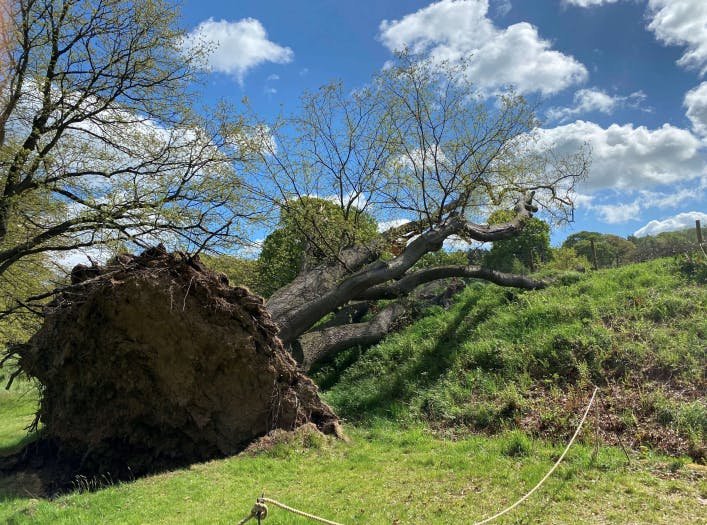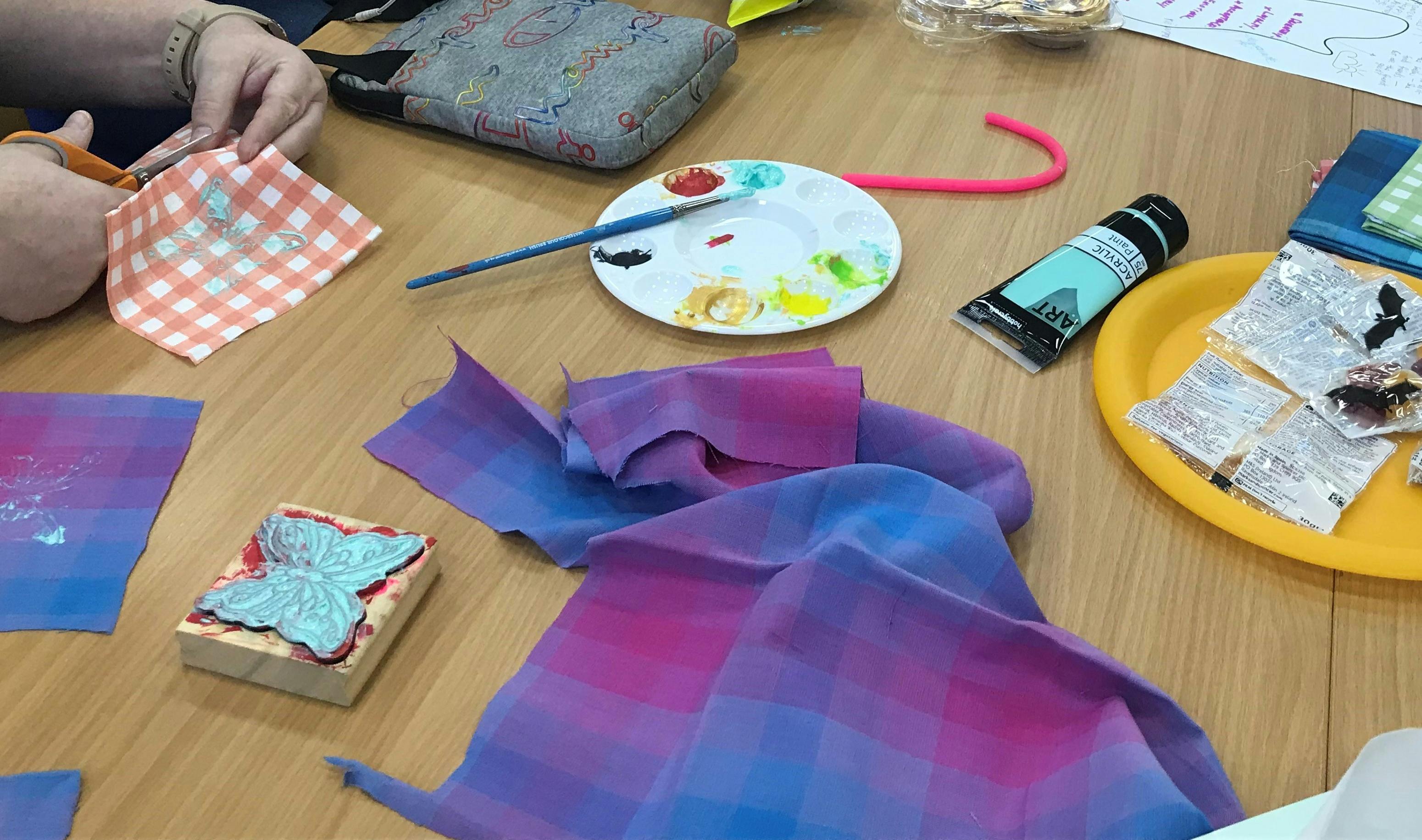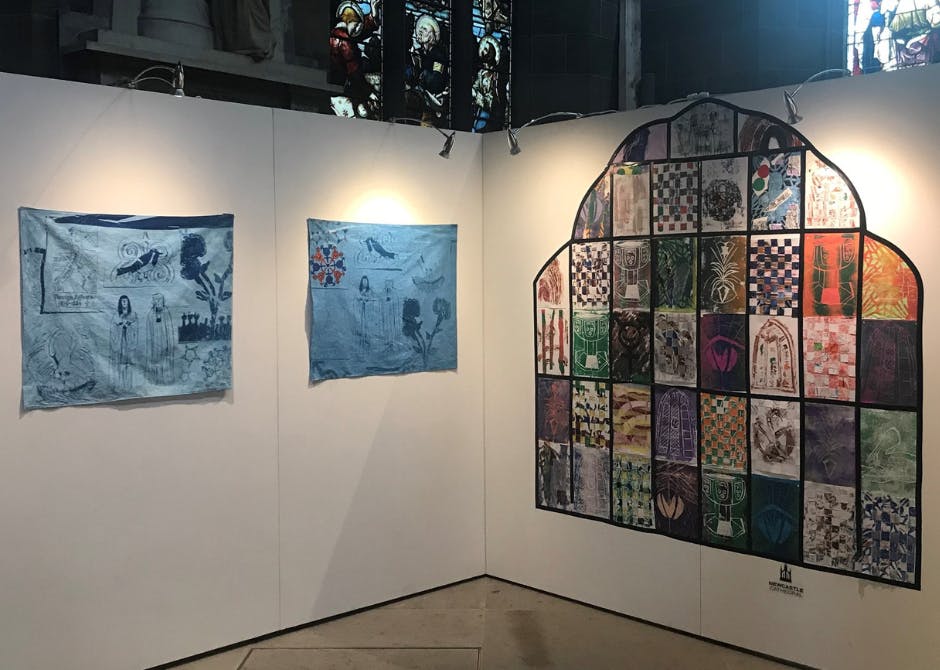In February 2022 one of the great storms tore down one of the 200 year old Oak Trees that lined the Long Walk at Gibside, a National Trust estate in rural Gateshead. Since that fateful day it has become part of the legacy of a ground-breaking project, ‘Story Chair’, that supports women in the criminal justice system to explore and relate their own stories; to offload the past and create new futures.
The ‘Story Chair’ programme is a creative collaboration between social justice charity, Changing Lives and the School of Design at the award-winning Northumbria University and is supported by the North East Probation Service. It also brings together a number of well-known arts and cultural institutions such as the National Trust and Newcastle Cathedral to question how those spaces and venues feel for the women and how they could be made more welcoming for those who might not already feel represented there.
And the tree? The oak tree itself is providing the wood to build a fantastic imaginative chair which has been designed by the women and representing their stories this far. This will tour across a number of venues and will be at the centre of the programme as it develops.
‘Story Chair’ engages with the fact that many women in the criminal justice system are there due to external and environmental factors in their lives that they often return to once released. These situations are often oppressive and exploitative and frequently lead to persistent re-offending. The programme addresses this need by enabling women to re-think their story.
“We’re hopeful that learning from this programme can be used to support people in difficult life situations. It would be wonderful to see arts and cultural venues embracing the suggestions in our toolkit to make their venues as welcoming as possible for everyone, while also literally showing their support by making space to host the Story Chair on its travels.”
Dr Angelika Strohmayer, Assistant Professor from Northumbria University’s School of Design, said: “This project is about supporting women with experience of the criminal justice system to feel able to discuss, accept and move on from one part of their lives, while empowering them to use their lived experience to inform more inclusive policies for the arts and cultural venues at the heart of communities.”
The ‘Story Chair’ programme featured a series of workshops involving more than 50 women across Newcastle, Ashington, North Tyneside and Sunderland. The workshops enabled the women, many of whom have experienced domestic violence, abuse or trauma in their lives, to explore story-telling techniques and develop crafting skills using fabrics and textiles to help illustrate their experiences. These processes created the time and space to lean into difficult conversations in a safe way.
Although the programme looked at the seven different ways to tell a story, the first session titled ‘Overcoming the Monster’ proved to resonate the most with the women.
“Sadly, the majority of the women were referencing the monster as being an ex-partner”, said Dawn Harrison, Changing Lives Service Manager for Criminal Justice, Northumbria.
Dawn, who created the programme in partnership with Dr Angelika Strohmayer from Northumbria University, continued: “All of the women used words such as ‘restricting’ and ‘consuming’ and the colours of the fabric chosen in their work were dark with many layers. Some had huge eyes but no other facial features. It was always a very powerful session.”
Amazingly a key aspect of the ‘Story Chair’ idea came from a chance visit to Newcastle Cathedral by a group of women from the project.
“The crypt within Newcastle Cathedral plays an integral part in the journey as this is where the Story Chair programme was born”, said Dawn.
She continued “Historically a small room which would have been used for people to come and say goodbye to the dead, the women were particularly taken with the idea of having a space to leave behind something, such as an old narrative which was no longer relevant or useful.”
The Cathedral responded by investing in the space and welcoming the women. It will now host the chair at the start of its journey, reinforcing the Cathedral’s ‘radical welcome’.
Jon Canessa, Lantern Initiative Lead, felt this was an important initiative for the Cathedral to respond to: “The Cathedral’s history is dominated by rich, white, businessmen. We do not want to cancel their story, but we do want to ensure the inspiring, humbling and powerful stories of these women are also heard and celebrated.”
The project has also been supported by funding from The British Academy - the UK’s national academy for the humanities and social sciences – and was chosen to be presented at their Summer Showcase in London at the end of June this year.
The story chair itself has been created and made by Northeast furniture maker, Nick James who worked alongside the women to develop ideas for its shape, look and feel.
Nick said: “It’s been a creative challenge and listening to the ideas from the women and the reason behind those ideas has been insightful and enlightening. It’s pushed me to think differently about what I’m doing creatively.”
And the story chair will be revealed for the first time at Newcastle Cathedral on the 8th September and remain there for a month before starting its tour and moving on to the National Trust property at Seaton Delaval Hall. The women will be involved in selecting other future venues that could host the chair.
Andrew Weatherhead, Senior Volunteering and Community Officer from the National Trust added: “This project and process has taught us so much and has reaffirmed our commitment to creating a more inclusive environment on site. It is important for people to know that we are welcoming and that we can offer wellbeing and a worthwhile experience to many regardless of background.”
Another part of the legacy from the project is a tool-kit for use by organisations including those working in the criminal justice system and others from wider community projects and cultural organisations. This will become available once launched on the day of the event.
Dr Angelika Strohmayer adds: “We’re hopeful that learning from this programme can be used to support people in difficult life situations. It would be wonderful to see arts and cultural venues embracing the suggestions in our toolkit to make their venues as welcoming as possible for everyone, while also literally showing their support by making space to host the Story Chair on its travels.”
As one participant put it: “We’ve talked in depth about really major things in our lives and then we can still have a laugh and be joyful.”
Another added: “It’s a safe space. You can be safe here which is a good thing, especially for women like us who have suffered from domestic violence and other trauma. It helps us move on.”
To learn more about the Story Chair, watch our video on how it came to be:
- Long version: https://youtu.be/8nmm5M3Y1co
- Short version: https://youtu.be/89Q7BdLoii0






